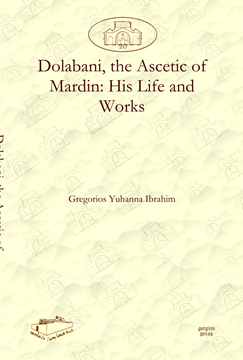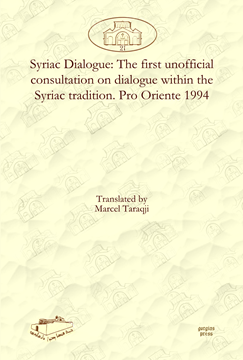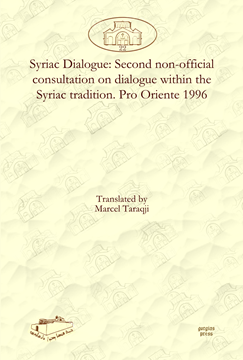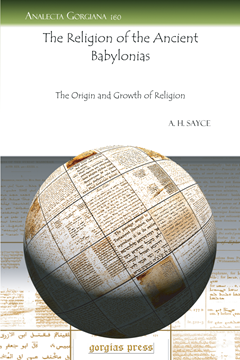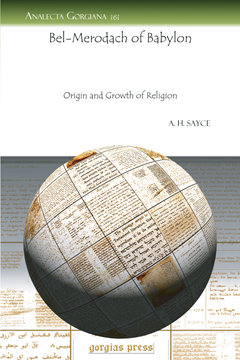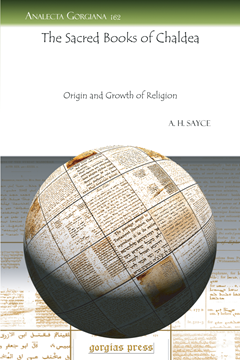His Life and Works
ISBN: 978-1-60724-171-3
Philoxenos Yuhanna Dolabani (1885-1969), Metropolitan of Mardin, was an important figure in the Syrian Orthodox church in the twentieth century and a prolific scholar, most of whose works remain unpublished and unknown to Western scholarship. Bishop Gregorios Yohanna Ibrahim has here given us a biography of this key figure.
$158.00 (USD) $94.80 (USD)
The first unofficial consultation on dialogue within the Syriac tradition. Pro Oriente 1994
Translated by Marcel Taraqji
ISBN: 978-1-60724-172-0
This volume is a translation into Arabic of the papers published as part of the Pro-Oriente ecumenical consultation between members of Roman Catholic, Chaldean Catholic, Syro-Malankar and Assyrian Orthodox Churches, originally published in Vienna in 1994. Participants included both European and Middle Eastern scholars and paper topics covered a range of issues relating to both the history and theology of the Church of the East.
$195.00 (USD) $117.00 (USD)
Second non-official consultation on dialogue within the Syriac tradition. Pro Oriente 1996
Translated by Marcel Taraqji
ISBN: 978-1-60724-173-7
This volume is a translation into Arabic of the papers and discussions published as part of the Pro-Oriente ecumenical consultation between members of Roman Catholic, Chaldean Catholic, Syro-Malankar, Syrian Orthodox, Maronite, and Assyrian Orthodox Churches, originally published in Vienna in 1994. Many of the papers in this volume are commentaries by members of the various churches represented at the consultation on the joint declaration issued by Pope John Paul II and Patriarch Denha IV. A number of other papers seeks to address the question of whether the Council of Ephesus unites or divides.
$203.00 (USD) $121.80 (USD)
The Religion of the Ancient Babylonias
The Origin and Growth of Religion
By A. H. Sayce
Series: Analecta Gorgiana 160
ISBN: 978-1-60724-175-1
As the introductory lecture to his collection of observations on ancient religion, Sayce begins this extract with a consideration of the difficulties of knowing what can be deduced from ancient Mesopotamian religion. Extracted from Sayce’s Origin and Growth of Religion, this booklet will be of interest to those who research the early period of the field of Assyriology in order to learn where various concepts about Mesopotamian religious life have their genesis.
$50.00 (USD) $30.00 (USD)
Bel-Merodach of Babylon
Origin and Growth of Religion
By A. H. Sayce
Series: Analecta Gorgiana 161
ISBN: 978-1-60724-176-8
In this second lecture extracted from Sayce’s Origin and Growth of Religion, the renowned Assyriologist specifically considers the Babylonian deity Bel-Merodach. Noting that Cyrus the Great was a worshipper of this deity, the outlook of the priesthood of Bel-Merodach regarding his conquest of Babylon begins the discussion. Sayce then discusses localized versions of Merodach, considering Eridu, Borsippa, and Assur.
$41.00 (USD) $24.60 (USD)
The Sacred Books of Chaldea
Origin and Growth of Religion
By A. H. Sayce
Series: Analecta Gorgiana 162
ISBN: 978-1-60724-177-5
This fifth extract from Sayce’s Origin and Growth of Religion, the topic turns to the “sacred books” of the Babylonians. Beginning with the “Chaldean Rig-Veda,” collections of hymns identified from the earliest days of Assyriology, Sayce also considers the earlier, less developed magical texts. Future considerations – sin, the status of heaven and Hades, and cosmology finish out the essay.
$43.00 (USD) $25.80 (USD)
